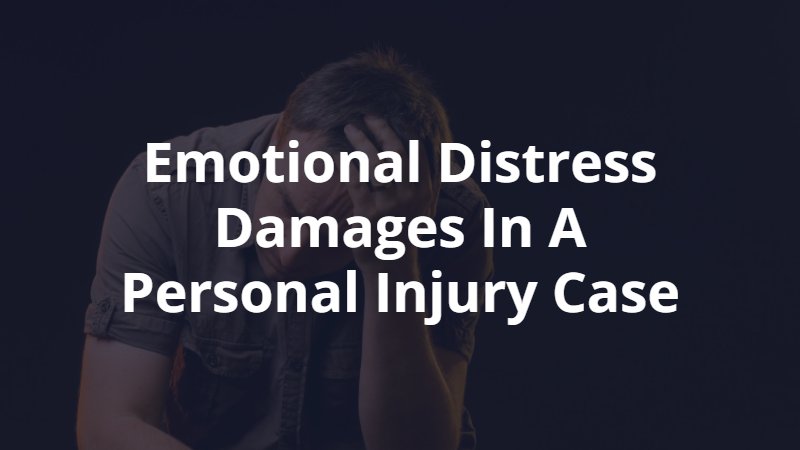A personal injury lawsuit in California can be filed not only for physical injuries but emotional, mental and psychological damage, as well. Serious accidents can be traumatizing for injured victims and witnesses. Individuals who suffer emotional or mental trauma can often seek compensatory damages for these injuries in a personal injury case.

How Is Emotional Distress Defined in Personal Injury Law?
Emotional distress refers to the intangible effects of an incident on a victim. In personal injury law, emotional distress is also referred to as pain and suffering, noneconomic damages, and general damages. Emotional distress can encompass physical pain, mental suffering, anguish, psychological trauma, lost enjoyment or quality of life, anxiety, depression, grief, humiliation, horror, post-traumatic stress disorder, and many other negative emotions and mental health issues.
Proving Emotional Distress in a Personal Injury Case
Emotional distress is recognized as compensable damage in a California personal injury case. If a victim can prove that he or she suffered emotional distress as an outcome of the accused party’s negligence, he or she can recover compensation. Negligence refers to the failure to act with proper care. It is also possible to base an emotional distress claim on intent to harm, or intentionally engaging in outrageous conduct. Victims can recover for both past and future emotional distress – the injuries they have already suffered as a result of the negligent act and the distress they will likely continue to experience in the future.
Proving the severity of emotional distress in a personal injury case can be challenging. Unlike a physical injury, emotional distress often does not have visible or tangible signs. Instead, these cases are proven through evidence of psychological symptoms, including records from therapists and psychologists, medical documentation, and expert testimony. Having a highly qualified mental health professional act as an expert can help establish the nature and extent of a plaintiff’s emotional distress.
Emotional distress also can be demonstrated through the victim’s own testimony and the testimony of loved ones who can provide examples regarding how the victim’s life has changed as a result of the negligence. For example, the victim can testify about the various activities they used to enjoy and no longer can and how difficult that is and will be in the future; a family member can testify about the victim’s demeanor prior to the incident and how it has changed as a result of the pain and suffering they have experienced.
Can You Sue Only for Emotional Distress in California?
Most claims for emotional distress damages in California are coupled with physical or bodily injuries. In these situations, claimants seek compensation for pain and suffering caused by their physical injuries. However, it is also possible to recover damages for emotional distress with no physical injury under some circumstances.
According to Series 1600 of the Judicial Council of California Civil Jury Instructions, a jury can award a victim (plaintiff) financial damages for emotional distress alone if the plaintiff can prove that the defendant was negligent, that he or she suffered serious emotional distress, and that the defendant’s negligence was a substantial factor in causing his or her emotional distress.
“Serious emotional distress” exists if an ordinary and reasonable person would be unable to cope with it, such as a severe level of suffering, shock, grief, anguish, fear or anxiety. Under state law, bystanders who witness traumatic incidents can also qualify for emotional distress damages if they suffered serious distress as a result of perceiving an injury to or the death of another person. Speak to a wrongful death lawyer in Los Angeles for more information.
How Are Emotional Distress Damages Calculated?
If you qualify for emotional distress damages, the amount of financial compensation that you are awarded will depend on the nature and extent of the trauma suffered. Longer-lasting cases of emotional distress may be assigned a greater value. Hiring a personal injury lawyer in Los Angeles can be essential to establishing your degree of mental anguish. A lawyer can work with mental health professionals, hire experts, and paint a compelling picture of the psychological trauma that you suffered due to someone else’s negligence or intentional wrongdoing.